In Remembrance
Posted: 11 November 2006 22:40
I'm writing this piece on Remembrance Day inspired by my research into anti-invasion defences being constructed by 45 Division in Sussex and Kent in 1940.
The tragic fact that links those mentioned below is not that they fell in battle within sight of the enemy, but that they were killed in accidents in preparation for a battle that was never fought.
The war diary of 210 Field Company, Royal Engineers, describes the first accident, which occurred on 8 September 1940:
11.00 hrs: Serious explosion at Chennel Park, while party of men were filling pipe mines resulting in the deaths of Sappers Jenness, Elson, Coles I.K., Woodward, Oaten, Corporal Smith K.R. and Lance-Corporal Vickery. The whole company are stricken with grief at such a calamity. Sappers Gamblin, Page and Goodger were conveyed to hospital suffering from injuries received in the accident. All three are comfortable.
The date is important here; less than 12 hours previously, the code word "Cromwell" had been issued, signifying that invasion was expected within 24 hours. Accidents through fatigue and/or haste were inevitable, given the gravity of the situation.
The deceased were returned to their next-of-kin and 4 regimental representatives attended each funeral on September 10. (One presumes that full military funerals were not possible due to the serious situation requiring every available man to be ready to meet the expected invasion.) At 09:00 hours on the same day, the whole company observed a two-minute silence for their fallen comrades; a memorial service was also held on the 15th.
Less than two weeks later, two similar tragedies were suffered in quick succession by 562 Field Company, Royal Engineers, in East Sussex. The following is from my blog of 11 June.
On 20 September 1940, the company sent a Sergeant H. Fall to Newhaven to lay "mushroom" mines; one of these exploded, killing an N.C.O. of the Royal Sussex Regiment and seriously injuring Fall. He was taken to hospital with serious injuries, where he died the following day.
A second incident occurred shortly afterwards on 22 September at Cuckmere Haven; the war diary reads as follows:
0930: 2/Lt Burns, Sgt. Lewis & 1 Driver left to connect up mushrooms at Cuckmere with Capt. Cambridge of the Sussex.
1400: C.Q.M.S. Curtis and Sgt. Line proceeded to Cuckfield Hospital ref. 'effects' & funeral of Sgt. Fall.
1500: Message received from 50th Sussex at Cuckmere to say that a Beach Mine explosion had occurred - killing 2L/t Burns, Capt. Cambridge (Royal Sussex), Sgt. Lewis & Dvr Ball - O.C. left immediately left for Cuckmere.
Regular readers will know that I've been out to Seaford and Cuckfield cemeteries to visit the graves of those who were buried locally.
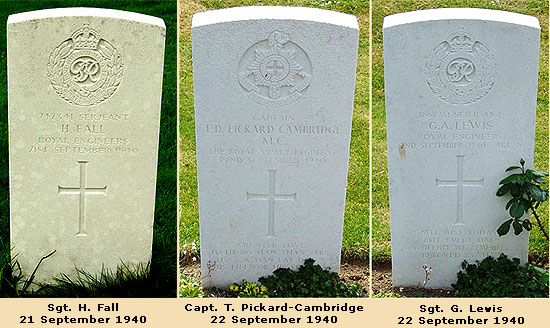
There were doubtless many other similar accidents; and while we should never forget the suffering endured in well-known campaigns such as the Somme, Normandy, Korea, the Falklands, Afghanistan and Iraq, I would like to draw attention to those who paid the ultimate price preparing to defend Britain against the greatest threat to her security in a thousand years.
- Pete

Email:
Blog Latest
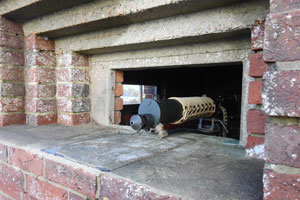
Bishopstone reveals its pillbox secrets
18 October 2021
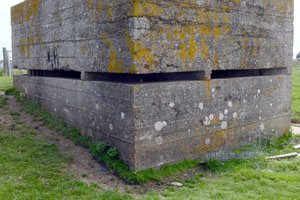
Pillbox or Observation Post?
10 June 2020
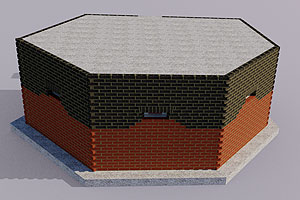
Uncovering the hidden secrets of a pillbox
8 June 2019
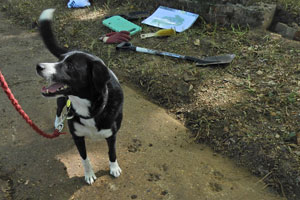
Review of 2018
31 December 2018
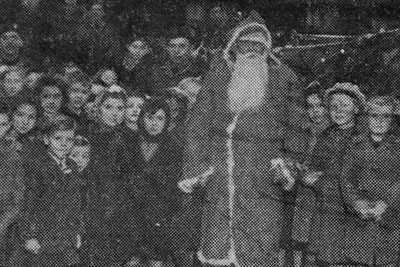
Wartime Christmas in East Sussex (2)
24 December 2018
Jargon-buster
Cromwell
The codeword issued by GHQ that invasion was imminent within 24 hours. Cromwell was issued on one occasion, on the evening of 7 September 1940, but was later cancelled.
Mushrooms
Naval Beach Mines
War diary
A record of events kept by all units from the point of mobilisation. A diary's contents vary enormously from unit to unit; some give detailed entries by the hour on a daily basis while others merely summarise events on a weekly/monthly basis.
This site is copyright © Peter Hibbs 2006 - 2024. All rights reserved.
Hibbs, Peter In Remembrance (2024) Available at: http://pillbox.org.uk/blog/216513/ Accessed: 27 July 2024
The information on this website is intended solely to describe the ongoing research activity of The Defence of East Sussex Project; it is not comprehensive or properly presented. It is therefore NOT suitable as a basis for producing derivative works or surveys!